国际会计第三次作业
西工大2020年4月《国际会计》作业机考参考答案
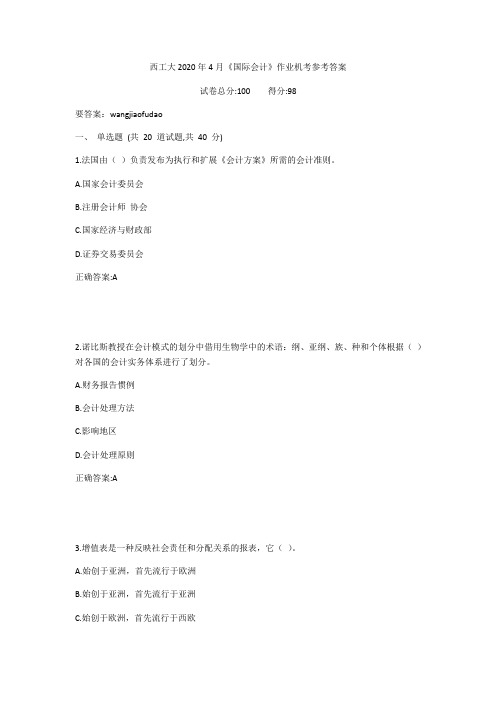
B.《关于跨国企业投资的概要》
C.《关于跨国企业信息披露的概要》
D.《关于跨国企业投资的指南》
正确答案:D
5.英国的应用的审计标准和指南是由()的审计标准委员会发布的。
A.注册会计师特许协会
B.管理会计师特许协会
C.财政与会计工作特许协会
D.会计职业团体协商委员会
正确答案:
D.其成员来源为美国证券交易委员会
正确答案:
14.美国会计模式的基本特征是()。
A.公认会计原则
B.真实与公允
C.形式重于实质
D.会计与税法一致
正确答案:
15.以下关于英美会计模式和欧洲大陆会计模式,不正确的是()。
A.英美会计要求公允表述,欧洲大陆会计要求遵循法律
B.英美会计要求“适度”稳健,欧洲大陆会计要求“极度”稳健
A.会计实务处于不断变革之中
B.会计职业届力量薄弱
C.为保护本国经济,独立制定会计准则
D.财务报表编制中与充分披露矛盾,政府干预严重、合法性高于公允性
正确答案:
9.法国由()负责发布为执行和扩展《会计方案》所需的会计准则。
A.国家会计委员会
B.注册会计师协会
C.国家经济与财政部
D.证券交易委员会
正确答案:
A.协调化是限制和缩小会计差异的过程
B.协调化是促进各国会计实务和财务信息的可比性的过程
C.协调化是能产生共同协作结果的有序结构的过程
D.协调化要求各用一套的统一的会计准则
正确答案:
6.日本1982年修订的《企业会计原则》是一份系统对基本会计原则作出表述的文告,其中包括的会计原则有()。
A.一般原则
A.联合国经济和社会理事会
国际会计复习题第三章

第三章比较会计模式一、单项选择题1、下列属于北欧会计模式特征的是(B )A强调公司按“真实和允许”的观点提供财务报告B以公司利益为导向的C服从于集中计划经济 D 服从于谁只需要2、通过“公认会计原则”,以保护证券市场投资人的利益为主要目的会计模式是(B )A英国会计模式B美国会计模式C法国-西班牙-意大利会计模式D北欧会计模式3、强调公司应按“真实和公允”(true and fair)的观点提供财务报告,主要是为了保护投资人和债权人的利益的会计模式是(A)A英国会计模式B美国会计模式C法国—西班牙—意大利会计模式D北欧会计模式4、以公司利益为导向的会计模式是(D)A英国会计模式B美国会计模式C前苏联会计模式D北欧会计模式二、多项选择题1、会计模式的内容可以包括(ABCD)A会计目的B会计原则C会计准则D会计的组织和管理体制2、流传颇广的阿伦的会计模式国际分类中,主要的会计模式有(ABCDE)A英国会计模式B美国会计模式C法国-西班牙-意大利会计模式D北欧会计模式E苏联会计模式F 中国会计模式3、下列国家的会计准则是由民间机构制定的是(AB )A美国B 英国C法国D中国4、下列对美国会计模式描述正确的是(ABC )A“公认会计原则”是其基本特征B 有官方支持和影响下的民间机构制定会计准则C税务会计与财务会计相背离D年度审计和财务报告的要求普遍适用于所有企业。
5、下列对英国会计模式描述正确的是(BCD )A 通过《经济法》管理公司事务,包括对公司的财务会计和报告的要求B 由民间机构制定会计准则C强调“真实”和“公允”D流行增值表,体现报告公司的社会经管责任。
6、法国会计模式的特征包括(ABC )A 以税务为导向B由政府颁布统一的会计方案C 极度稳健D实质胜于形式7、下列属于德国会计服从的法律要求包括(ABC )A 税法B商法C公司法D 民法8、下列属于德国会计模式的特征的是(ABD )A 会计服从于法律B 不要求充分披露C 按销售成本法编制损益表D 按总费用法编制损益表9、在日本的“三法体制”中,三法是指(ABD )。
会计学原理第三次作业范文

了解企业财务管 理和决策分析的 流程与技巧
对课程的建议与意见
课程内容:希望增 加更多实际案例和 实践操作,以帮助 学生更好地理解和 应用会计学原理。
课程难度:建议适 当调整课程难度, 以满足不同学生的 需求。
作业安排:希望老 师能够更加明确作 业要求,以便学生 更好地完成作业。
课堂互动:希望老 师能够增加课堂互 动环节,鼓励学生 积极参与讨论,提 高学生的学习兴趣 和思考能力。
财务报表的种类:资产负债表、利润表、现金流量表等
编制方法:根据会计科目和账簿记录进行分类汇总 分析报告的内容:对财务报表中的数据进行分析,揭示企业的财务状 况、经营成果和现金流量情况 目的:为投资者、债权人、企业经营管理者等提供决策依据
小组讨论成果展示与交流
讨论主题:会计学原理第三次作业的完成情况 讨论过程:小组成员分别介绍自己的作业成果,提出问题和建议 讨论结果:汇总各成员的作业成果,形成小组统一的答案和思路 交流收获:通过讨论交流,加深了对会计学原理的理解和掌握,提高了团队协作和沟通能力
内容要准确:确保报告中的数据和信息准确无误,符合实际情况。 结构要清晰:采用适当的组织结构,如引言、正文、结论等,使报告易于理解和接受。 语言要简练:使用简洁明了的语言,避免过多的专业术语和复杂的句子结构。 格式要规范:遵循学校或老师要求的格式规范,包括字体、字号、行间距等。
财务报表的编制与分析报告
实践操作
了解题目要求和作业目标 收集相关资料和信息 制定详细的计划和步骤 按照计划逐步完成作业
小组讨论与交流
小组讨论:成员之间互相交流,分享观点和经验 交流技巧:倾听、表达、提问等技巧的运用 讨论目标:明确讨论目标,确保讨论效果 讨论成果:总结讨论成果,形成小组意见
西工大17秋《国际会计》在线作业1609【精选】
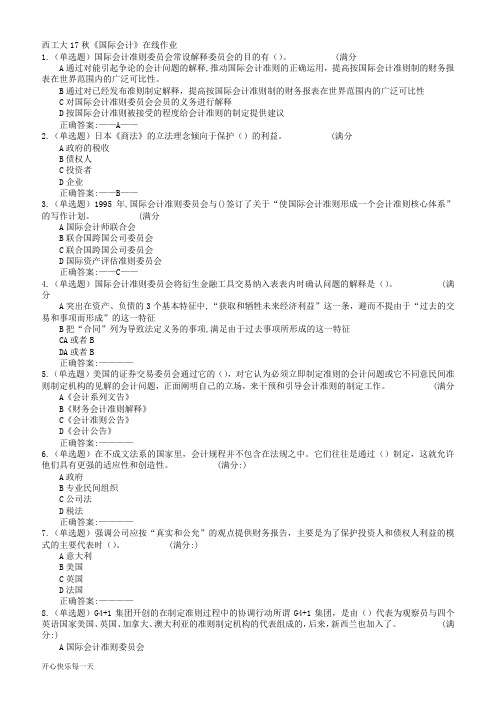
西工大17秋《国际会计》在线作业1.(单选题)国际会计准则委员会常设解释委员会的目的有()。
(满分A通过对能引起争论的会计问题的解释,推动国际会计准则的正确运用,提高按国际会计准则制的财务报表在世界范围内的广泛可比性。
B通过对已经发布准则制定解释,提高按国际会计准则制的财务报表在世界范围内的广泛可比性C对国际会计准则委员会会员的义务进行解释D按国际会计准则被接受的程度给会计准则的制定提供建议正确答案:——A——2.(单选题)日本《商法》的立法理念倾向于保护()的利益。
(满分A政府的税收B债权人C投资者D企业正确答案:——B——3.(单选题)1995年,国际会计准则委员会与()签订了关于“使国际会计准则形成一个会计准则核心体系”的写作计划。
(满分A国际会计师联合会B联合国跨国公司委员会C联合国跨国公司委员会D国际资产评估准则委员会正确答案:——C——4.(单选题)国际会计准则委员会将衍生金融工具交易纳入表表内时确认问题的解释是()。
(满分A突出在资产、负债的3个基本特征中,“获取和牺牲未来经济利益”这一条,避而不提由于“过去的交易和事项而形成”的这一特征B把“合同”列为导致法定义务的事项,满足由于过去事项所形成的这一特征CA或者BDA或者B正确答案:————5.(单选题)美国的证券交易委员会通过它的(),对它认为必须立即制定准则的会计问题或它不同意民间准则制定机构的见解的会计问题,正面阐明自己的立场,来干预和引导会计准则的制定工作。
(满分 A《会计系列文告》B《财务会计准则解释》C《会计准则公告》D《会计公告》正确答案:————6.(单选题)在不成文法系的国家里,会计规程并不包含在法规之中。
它们往往是通过()制定,这就允许他们具有更强的适应性和创造性。
(满分:)A政府B专业民间组织C公司法D税法正确答案:————7.(单选题)强调公司应按“真实和公允”的观点提供财务报告,主要是为了保护投资人和债权人利益的模式的主要代表时()。
国际会计第七版课后答案(第三章)
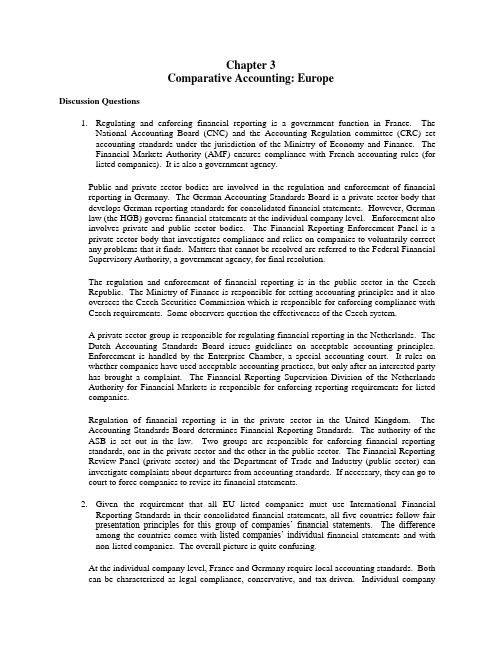
Chapter 3Comparative Accounting: EuropeDiscussion Questions1.Regulating and enforcing financial reporting is a government function in France. TheNational Accounting Board (CNC) and the Accounting Regulation committee (CRC) setaccounting standards under the jurisdiction of the Ministry of Economy and Finance. TheFinancial Markets Authority (AMF) ensures compliance with French accounting rules (forlisted companies). It is also a government agency.Public and private sector bodies are involved in the regulation and enforcement of financial reporting in Germany. The German Accounting Standards Board is a private sector body that develops German reporting standards for consolidated financial statements. However, German law (the HGB) governs financial statements at the individual company level. Enforcement also involves private and public sector bodies. The Financial Reporting Enforcement Panel is a private sector body that investigates compliance and relies on companies to voluntarily correct any problems that it finds. Matters that cannot be resolved are referred to the Federal Financial Supervisory Authority, a government agency, for final resolution.The regulation and enforcement of financial reporting is in the public sector in the Czech Republic. The Ministry of Finance is responsible for setting accounting principles and it also oversees the Czech Securities Commission which is responsible for enforcing compliance with Czech requirements. Some observers question the effectiveness of the Czech system.A private sector group is responsible for regulating financial reporting in the Netherlands. TheDutch Accounting Standards Board issues guidelines on acceptable accounting principles.Enforcement is handled by the Enterprise Chamber, a special accounting court. It rules on whether companies have used acceptable accounting practices, but only after an interested party has brought a complaint. The Financial Reporting Supervision Division of the Netherlands Authority for Financial Markets is responsible for enforcing reporting requirements for listed companies.Regulation of financial reporting is in the private sector in the United Kingdom. The Accounting Standards Board determines Financial Reporting Standards. The authority of the ASB is set out in the law. Two groups are responsible for enforcing financial reporting standards, one in the private sector and the other in the public sector. The Financial Reporting Review Panel (private sector) and the Department of Trade and Industry (public sector) can investigate complaints about departures from accounting standards. If necessary, they can go to court to force companies to revise its financial statements.2.Given the requirement that all EU listed companies must use International FinancialReporting Standards in their consolidated financial statements, all five countries follow fairpresentation principles for this group of companies’ financial statements. The differenceamong the countries comes with listed companies’ individu al financial statements and withnon-listed companies. The overall picture is quite confusing.At the individual company level, France and Germany require local accounting standards. Both can be characterized as legal compliance, conservative, and tax-driven. Individual companyfinancial statements in the Netherlands and United Kingdom may use either local requirements or IFRS. However, in either case the result is fair presentation financial statements. The Czech Republic requires IFRS in listed c ompanies’ individual company financial statements, so the result is that they are fair presentation. In all five countries, non-listed companies may use either IFRS or local accounting standards for their consolidated financial statements. As characterized above, the resulting financial statements will be quite different for German and French companies. Czech accounting standards are mostly fair presentation, but there is still some tax influence. Thus, the resulting financial statements can also be different depending on the choice that companies make. Finally, non-listed companies’ individual financial statements must be prepared under local accounting standards in the Czech Republic, France, and Germany. Local accounting standards or IFRS may be used by this group of companies in the Netherlands and United Kingdom.3.The recently established auditor oversight bodies discussed in this chapter are:a.France –Haut Conseil du Commissariat aux Comptes (High Council of ExternalAuditors)herlands – Netherlands Authority for Financial Marketsc.United Kingdom – Professional Oversight BoardThe oversight body in France is in a government agency, while the one in the U.K. is a private sector body. The Dutch body is an autonomous administrative authority under the Ministry of Finance. They are a response to recent accounting scandals and represent efforts to the tighten control over auditors.4. Tax legislation is a significant influence on local accounting requirements in France andGermany. It is unimportant in the Netherlands and United Kingdom. Tax legislation has limited influence in the Czech Republic. Given that Czech accounting is still evolving, tax law can be expected to fill in areas where accounting standards are missing.5. Consolidated financial statements are the statements of a group of companies under commonmanagement or control. Individual company financial statements are the statements of the separate legal entities (parent and subsidiaries) that make up the group. EU countries prohibit IFRS for individual company financial statements when these statements are the basis for taxation and dividend distributions. They are “legal compliance” countries (see Chapter 2) and individual company financial statements must comply with the law. Other countries permit or require IFRS for individual company financial statements because they are “fair presentation”countries (Chapter 2). Individual company financial statements are not the basis for taxation or dividends. Local accounting standards follow fair presentation principles.6. There is no conclusive evidence linking high levels of legal accounting and reportingrequirements in a country and corresponding high quality levels of financial reporting. It appears that high legal requirements (for example, in France and Germany) lead to a certain amount of professional or bureaucratic inertia and form over substance thinking in financial reporting. Indeed, countries with significant state regulation of accounting and accountants are generally not among the innovative accounting leadership countries. If anything, comparatively high levels of legal requirements appear to depress the overall quality of reporting.7.This quote paraphrases a statement in the preamble to the charter establishing the GermanAccounting Standards Committee. We agree. Private sector initiatives (self-regulation) have。
国际会计第七版课后答案(第三章)

Chapter 3Comparative Accounting: EuropeDiscussion Questions1.Regulating and enforcing financial reporting is a government function in France. TheNational Accounting Board (CNC) and the Accounting Regulation committee (CRC) setaccounting standards under the jurisdiction of the Ministry of Economy and Finance. TheFinancial Markets Authority (AMF) ensures compliance with French accounting rules (forlisted companies). It is also a government agency.Public and private sector bodies are involved in the regulation and enforcement of financial reporting in Germany. The German Accounting Standards Board is a private sector body that develops German reporting standards for consolidated financial statements. However, German law (the HGB) governs financial statements at the individual company level. Enforcement also involves private and public sector bodies. The Financial Reporting Enforcement Panel is a private sector body that investigates compliance and relies on companies to voluntarily correct any problems that it finds. Matters that cannot be resolved are referred to the Federal Financial Supervisory Authority, a government agency, for final resolution.The regulation and enforcement of financial reporting is in the public sector in the Czech Republic. The Ministry of Finance is responsible for setting accounting principles and it also oversees the Czech Securities Commission which is responsible for enforcing compliance with Czech requirements. Some observers question the effectiveness of the Czech system.A private sector group is responsible for regulating financial reporting in the Netherlands. TheDutch Accounting Standards Board issues guidelines on acceptable accounting principles.Enforcement is handled by the Enterprise Chamber, a special accounting court. It rules on whether companies have used acceptable accounting practices, but only after an interested party has brought a complaint. The Financial Reporting Supervision Division of the Netherlands Authority for Financial Markets is responsible for enforcing reporting requirements for listed companies.Regulation of financial reporting is in the private sector in the United Kingdom. The Accounting Standards Board determines Financial Reporting Standards. The authority of the ASB is set out in the law. Two groups are responsible for enforcing financial reporting standards, one in the private sector and the other in the public sector. The Financial Reporting Review Panel (private sector) and the Department of Trade and Industry (public sector) can investigate complaints about departures from accounting standards. If necessary, they can go to court to force companies to revise its financial statements.2.Given the requirement that all EU listed companies must use International FinancialReporting Standards in their consolidated financial statements, all five countries follow fairpresentation principles for this group of companies’ financial statements. The differenceamong the countries comes with listed companies’ individu al financial statements and withnon-listed companies. The overall picture is quite confusing.At the individual company level, France and Germany require local accounting standards. Both can be characterized as legal compliance, conservative, and tax-driven. Individual companyfinancial statements in the Netherlands and United Kingdom may use either local requirements or IFRS. However, in either case the result is fair presentation financial statements. The Czech Republic requires IFRS in listed c ompanies’ individual company financial statements, so the result is that they are fair presentation. In all five countries, non-listed companies may use either IFRS or local accounting standards for their consolidated financial statements. As characterized above, the resulting financial statements will be quite different for German and French companies. Czech accounting standards are mostly fair presentation, but there is still some tax influence. Thus, the resulting financial statements can also be different depending on the choice that companies make. Finally, non-listed companies’ individual financial statements must be prepared under local accounting standards in the Czech Republic, France, and Germany. Local accounting standards or IFRS may be used by this group of companies in the Netherlands and United Kingdom.3.The recently established auditor oversight bodies discussed in this chapter are:a.France –Haut Conseil du Commissariat aux Comptes (High Council of ExternalAuditors)herlands – Netherlands Authority for Financial Marketsc.United Kingdom – Professional Oversight BoardThe oversight body in France is in a government agency, while the one in the U.K. is a private sector body. The Dutch body is an autonomous administrative authority under the Ministry of Finance. They are a response to recent accounting scandals and represent efforts to the tighten control over auditors.4. Tax legislation is a significant influence on local accounting requirements in France andGermany. It is unimportant in the Netherlands and United Kingdom. Tax legislation has limited influence in the Czech Republic. Given that Czech accounting is still evolving, tax law can be expected to fill in areas where accounting standards are missing.5. Consolidated financial statements are the statements of a group of companies under commonmanagement or control. Individual company financial statements are the statements of the separate legal entities (parent and subsidiaries) that make up the group. EU countries prohibit IFRS for individual company financial statements when these statements are the basis for taxation and dividend distributions. They are “legal compliance” countries (see Chapter 2) and individual company financial statements must comply with the law. Other countries permit or require IFRS for individual company financial statements because they are “fair presentation”countries (Chapter 2). Individual company financial statements are not the basis for taxation or dividends. Local accounting standards follow fair presentation principles.6. There is no conclusive evidence linking high levels of legal accounting and reportingrequirements in a country and corresponding high quality levels of financial reporting. It appears that high legal requirements (for example, in France and Germany) lead to a certain amount of professional or bureaucratic inertia and form over substance thinking in financial reporting. Indeed, countries with significant state regulation of accounting and accountants are generally not among the innovative accounting leadership countries. If anything, comparatively high levels of legal requirements appear to depress the overall quality of reporting.7.This quote paraphrases a statement in the preamble to the charter establishing the GermanAccounting Standards Committee. We agree. Private sector initiatives (self-regulation) havebeen more successful than governmental initiatives in developing financial reporting regulations for national and international capital markets.Two noteworthy examples are the Accounting Standards Board in the U.K. (discussed in Chapter 3) and the Financial Accounting Standards Board in the U.S. (discussed in Chapter 4).Both have been flexible and adaptable in developing reporting standards in response to new circumstances. They are arguably the premier national standard setting bodies in the world. It is also noteworthy that Germany and Japan (Chapter 4) have recently moved to establish private sector organizations.Chapter 8 discusses international harmonization and convergence. There, the work of the International Accounting Standards Board and the European Union are discussed. The EU was not effective in establishing standards for capital markets and has now endorsed the efforts of the IASB.8. Existing French companies’ legislation in the form of the Plan Comptable Général and Code deCommerce have the greatest influence on day-to-day French accounting practices. The two other authoritative sources of financial accounting standards and practices have comparatively modest or sporadic influence.9. The statement is true. The German Accounting Standards Board is a private-sector body likethe FASB (U.S.), ASB (U.K.), and IASB. The process for establishing standards is also similar.Working groups examine issues and make recommendations to the Board. These groups represent a broad constituency. GASB deliberations follow a due process and meetings are open.10.Accounting requirements in the Czech Republic are based on EU Directives. Examples noted inthe chapter are the following:a.True and fair view embodied in the Accountancy Act.b.Required audit.c.Statement of cash flows not a required financial statement (though it is required in thenotes).d.Disclosures of employee information and revenues by segment.e.Consolidated financial statements required.f.Abbreviated reporting requirements for small companies.g.Notes include accounting policies.h.Listed companies use IFRS in consolidated financial statements.The accounting measurements discussed are also consistent with EU Directives, for example, the requirement for the equity method.11.The Dutch Enterprise Chamber of the Court of Justice of Amsterdam helps ensure that filed orpublished Dutch financial statements conform to all applicable laws. Shareholders, employees, trade unions, or public prosecutors may bring proceedings to the Chamber by alleging that officially filed or published financial statements do not conform to applicable requirements.The Enterprise Chamber carries out its mission by determining whether the allegations of deficient financial reporting are true and how material such deficiencies are. Depending uponthe case, the Chamber may require that financial statements be modified or it may seekpenalties through the Court of Justice.The Chamber is composed of three judges and two Dutch RAs. There is no jury. Appeals of anyof the Chambers rulings are difficult, may only be lodged with the Dutch Supreme Court, andare restricted to points of law.12.Britis h financial statements must present a “true and fair view” of a company’s financial positionand results of operations. The intent is similar to the U.S. “presents fairly.” However, the “presents fairly” test in the United States is whether financial sta tements conform to U.S. GAAP.The “true and fair” test in the United Kingdom requires auditors to step back and see whether the financial statements –taken as a whole –result in a fair presentation. U.K. GAAP may be overridden if complying with them wo uld result in an “unfair” presentation. In other words, judgment is exercised in determining whether the financial statements are true and fair. Exercises1. Francea.The Conseil National de la Comptabilité, or CNC (National Accounting Board) throughthe latest Plan Comptable Général and the Comité de la Réglementation Comptable, orCRC (Accounting Regulation Committee). The CNC and CRC are attached to theMinistry of Economy and Finance.b.The Autoritédes Marches Financiers (AMF) for French listed firms. The Division ofCorporate Finance (SOIF) conducts a general review of legal and other filings with theAMF. The Accounting Division (SACF) verifies compliance with accounting standards.The Ministry of Justice is indirectly responsible for compliance with reportingrequirements by non-listed companies through its role in supervising statutory auditors.Germanya.The German Accounting Standards Board for consolidated financial statements.Parliamentary legislation for individual company financial statements.b.The Financial Reporting Enforcement Panel (FREP). Matters that FREP cannot resolveare referred to Federal Financial Supervisory Authority (BaFin).Czech Republica.The Ministry of Finance.b.The Ministry of Finance also has supervisory responsibilities. Audits are regulated by theAct on Auditors which established Chamber of Auditors to oversee the auditingprofession.The Netherlandsa.Dutch Accounting Standards Board.b.Dutch Enterprise Chamber of the Court of Justice in Amsterdam. Financial ReportingSupervision Division of the Netherlands Authority for Financial Markets for listed firms.United Kingdoma.Accounting Standards Board.b.Both the Department of Trade and Industry and the Financial Reporting Review Panel ofthe Financial Reporting Council can investigate complaints about departures fromaccounting standards and they can go to court if necessary to force compliance.2. Good arguments can be made that France and Germany have the most effective accounting andfinancial reporting supervision mechanism for publicly traded companies. In France, the Autoritédes Marches Financiers (AMF) is a government agency that supervises the stock market. It is the French equivalent of the U.S. Securities and Exchange Commission (SEC). Two divisions within the AMF enforce compliance with reporting rules. The Division of Corporate Finance (SOIF) conducts a general review of legal and other filings with the AMF (including the annual report).The Accounting Division (SACF) verifies compliance with accounting standards. The AMF has the power to force compliance with accounting requirements. Germany has a two-tiered system.A private sector body, the Financial Reporting Enforcement Panel (FREP) reviews suspectedirregular financial statements that come to its attention. It also conducts random review of financial statements. If companies do not voluntarily change their financial statements, FREP refers the matter to the Federal Financial Supervisory Authority (BaFin), a government agency that regulates the stock exchanges (and banking and insurance industries). In both countries, the agencies responsible for compliance are proactive. The responsibility in the Czech Republic is the Ministry of Finance, but there are many questions about its effectiveness. The responsibility in the Netherlands rests with the Enterprise Chamber. However, it isn’t proactive – cases must be brought to it first. The Financial Reporting Supervision Division of the Netherlands Authority for Financial Markets is new (2006) but it can be expected to be effective. In the United Kingdom, the Financial Reporting Review Panel and the Department of Trade and Industry investigate complaints about financial reporting practices. It isn’t clear how proactive either o ne is in enforcing reporting standards for publicly traded companies. The United Kingdom does not have the equivalent of the U.S. SEC. In our view the most effective way to enforce accounting and financial reporting rules for publicly traded companies is a through government agency that is proactive in insuring compliance.3. At the time of writing, the following accounting organizations discussed in this chapter werelinked to IFAC s website:FranceCompagnie Nationale des Commissaires aux ComptesConseil Supérieur de l’Ordre des Experts-ComptablesGermanyInstitut der Wirtschaftsprüfer in Deutschland e.v.WirtschaftsprüferkammerCzech RepublicChamber of Auditors of the Czech RepublicUnion of Accountants of the Czech RepublicThe NetherlandsKoninklijk Nederlands Instituut van Registeraccountants (Royal NIvRA)United KingdomChartered Institute of Management AccountantsInstitute of Chartered Accountants in England and WalesChartered Institute of Public Finance and AccountancyThe Association of Chartered Certified AccountantsInstitute of Chartered Accountants of Scotland4.The question asked for five expressions, terms, or short phrases unfamiliar or unusual in thestudent’s home country. Taking the United States as the home country, here are eighteen:a.Duality in individual company and consolidated statements — The idea that the two setsof financial statements may be based on different GAAP, as in France in Germany.b.Social report —Required in France for companies with 300 or more employees itdescribes, analyzes, and reports on matters of training, industrial relations, health andsafety conditions, wage levels, benefits, and other work conditions.panies Act — National law regulating, among other things, financial reporting anddisclosures by companies.d.True and fair override — The idea in the U.K. that professional judgment can override astandard if necessary to give a true and fair view.e.Provisions and reserves — Used to smooth income and often based on tax laws, such asin Germany.f.National chart of accounts — A formal chart of accounts designed for an entire economyand typically used for strong central economic control.g.Secret reserves —Undisclosed and deliberate understatements of assets oroverstatements of liabilities.h.Plan Comptable Général — French uniform national chart of accounts.i.Sworn book examiners — A class of statutory auditors legally sanctioned in Germany toconduct independent audit examinations of companies.j.Statutory auditors —Auditors who are required by law (statute) to audit a company’s financial statements.k.Enterprise Chamber of the Court of Justice of Amsterdam —A judicial institution receiving formal complaints of nonconformance with established Dutch accounting andreporting standards.l.Generally acceptable accounting principles — Accounting guidelines issued by the Dutch Accounting Standards Board in the Netherlands.m.Proportional consolidation —Consolidation technique often used for joint ventures where all assets and liabilities are prorated to the owners in strict proportion to theirrespective ownership interest percentages.n.Legal reserves — Appropriations of retained earnings required by law in most code law countries.o.Determination principle — German requirement for book/tax conformity.p.Parent company only statements —Unconsolidated financial statements of a company controlling other (subsidiary) companies.q.Coupon voucher privatization system - the method used by the Czech Republic to privatize large-scale, government-owned enterprises. Vouchers allowed CR citizens tobuy shares for a nominal price.r.Joint stock companies and limited liability companies - the terms used in the CR for corporations and limited liability partnerships, respectively. Joint stock companies issueshares while limited liability companies do not.5.For each country discussed in the chapter, there are several financial accounting practices orprinciples at variance with international norms. The items below are illustrative only.a.France –Liabilities for post-employment benefits do not have to be recognized andfinance leases do not have to be capitalized. Both accounting treatments are examples ofform over substance and violate fair presentation. The treatment of post-employmentbenefits will understate reported earnings and understate reported liabilities. The debt toasset ratio will be understated. It is unlikely that an analyst will be able to adjust for thisvariance. The treatment of leases understates assets and liabilities, and understates thedebt to asset ratio. The effect on income depends on how much lease payments differfrom the amount of depreciation that would be recognized had the leased property beencapitalized. It is unlikely that an analyst can adjust for this variance.b.Germany - Two different purchase methods are allowed, and goodwill can be treatedseveral ways. The effects on reported earnings and the debt to asset ratio are unclear andit is unlikely that an analyst can adjust for these variances.c.Czech Republic –Goodwill may be written off in the first year of consolidation orcapitalized and amortized over a maximum of 20 years. The international norm is now tocapitalize goodwill and impairments test it each year. If goodwill is written offimmediately, there will be no effect on income compared to the international norm,except in a year where an impairments write-down would occur. The debt to asset ratiowill be higher compared to the international norm. If goodwill is capitalized andamortized, reported earnings will be lower than what it would be under the internationalnorm. As goodwill gets amortized, the debt to asset ratio will increase compared to theinternational norm. Analysts should be able to adjust to achieve “apples to apples”comparisons as long as the effects of the goodwill accounting are disclosed by Czechcompanies.d.The Netherlands - Comprehensive current value accounting. Though only used by aminority of Dutch companies, this microeconomics approach to measurement isencouraged in the Netherlands to an extent not seen elsewhere. Expenses should behigher under current value accounting, especially for cost of goods sold and depreciation.This means that reported earnings will be lower. With higher asset values, the debt toasset ratio will decrease. Generally, the effects of applying current value accounting aredisclosed in footnotes, so analysts should be able to adjust for this variance.e.U.K. – Assets may be valued at historical cost, current cost, or a combination of the two.To the extent that current cost is used, the effects on reported earnings and the debt toasset ratio will be the same as described for Dutch current value accounting. Analystswill be able to adjust for this variance to the extent that the effects of using current costsare disclosed in the footnotes.6. At the time of writing, the following numbers are reported by the World Federation of Stocka Euronext is a merger of the Paris, Amsterdam, and Brussels Stock Exchanges.The London Stock Exchange is significantly larger than the other stock exchanges in terms of numbers of listed companies. It also has more foreign listed firms. However, Euronext has proportionately more foreign listed firms than the other exchanges. Students will probably speculate that most of the “foreign” listed firms on these exchanges are from other European countries, a statement that is in fact true. No data are reported by the Prague Stock Exchange. It is not a member of the World Federation of Stock Exchanges. However, the chapter notes that the Prague Stock Exchange is small.7. The country whose GAAP is most oriented toward equity investors appears to be the UnitedKingdom. Its GAAP is closest to IFRS, which is clearly aimed at equity investors. Under U.K.GAAP, goodwill may be capitalized and impairments tested, the IFRS treatment. LIFO is alsonot permitted, the IFRS treatment. The Netherlands comes in “second,” but Dutch GAAP differs with IFRS on these two issues. The country whose GAAP is least oriented toward equity investors appears to be Germany, with France a close second. Germany has the most differences with IFRS.8. At the time of writing, the following companies are listed on the New York Stock Exchange fromthe European countries discussed in this chapter:FranceAir France - KLMAlcatel-LucentAlstomAXACompagnie Generale Geophysique-VeritasFrance TelecomGroupe DanoneLafargePublicis GroupeRhodiaSanofi-SynthelaboSCOR GroupSodexho AllianceSuezTechnipThomsonTOTAL .Veolia EnvironmentGermanyAllianzAltanaBASFBayerDaimlerChryslerDeutsche BankDeutsche TelekomE.ONEpcosFresenius Medical CareInfineon TechnologiesPfeiffer Vacuum TechnologyQimondaSAPSGL CarbonSiemensCzech Republic – None.NetherlandsABN AMROAEGONAerCap HoldingsArcelor MittalBuhrmannChicago Bridge & Iron CompanyCNH GlobalCore LaboratoriesHeadING GroupJames Hardies IndustriesReed ElsevierRoyal AholdRoyal Dutch ShellRoyal KPNRoyal Philips ElectronicsTNTUnileverVan der Moolen Holding United KingdomAbbey NationalAMVESCAPAstraZeneca GroupBarclays BankBarclaysBG GroupBHP BillitonBPBritish AirwaysBritish Sky Broadcasting GroupBT GroupBunzlCadbury SchweppesCarnivalCorus GroupDiageoGallaher GroupGlaxoSmithKlineHansonHSBC HoldingImperial Chemical IndustryImperial Tobacco GroupInterContinental Hotels GroupInternational PowerLloyds TSB GroupNational GridNational Westminster BankPearsonPrudentialReed ElsevierRio TintoThe Royal Bank of Scotland GroupScottish PowerSignet GroupSmith & NephewSpirent CommunicationsTomkinsUnileverUnited UtilitiesVodafone GroupWOLSELEYThe United Kingdom and the Netherlands have the most listed companies from European countries. The United Kingdom has the most, reflecting a common language and financial reporting heritage with the United States. The Netherlands has the second most. The chapter talks about Dutch companies’ long history of international listings and the fact that the Amsterdam Stock Exchange has not been an important source of finance. It is not surprising that Dutch companies would look to the United States for finance. Dutch financial reporting is also aimed at fair presentation, just as the United States (and United Kingdom). There are no Czech companies listed on the NYSE, reflecting the fact that the Czech Republic has only recently become a market economy.9. The role of government in developing accounting and auditing standards is strongest in France.Government agencies are responsible for both activities and government involvement is all-encompassing. The private sector has little or no influence. The government plays the least role in the United Kingdom and the Netherlands. In both countries, the private sector is responsible for both accounting and auditing standards. Government influence is strong in Germany, but the German Accounting Standards Board is in the private sector and the German Institute is responsible for audit standards. The government is responsible for accounting standards in the Czech Republic (the Ministry of Finance), but auditing standards are developed by the Chamber of Auditors, a self-regulated professional body.10. The European Commission has set up the European Group of Auditors’ Oversight Bodies(EGAOB) to coordinate the new public oversight systems of statutory auditors and audit firms within the European Union. The EGAOB may also provide input to the Commission on issues such as endorsing International Standards on Auditing and assessing the public oversight systems in individual European countries. These public oversight systems have responsibility for overseeing:•The approval and registration of statutory auditors and audit firms•The adoption of standards on ethics, internal control of audit firms and auditing•Continuing education, quality assurance and investigative and disciplinary systems.At the time of writing, the EU Web site listed four EU countries with an auditing oversight body: •France (Le Haut Conseil du Commissariat aux Comptes)•Germany (Abschlussprüferaufsichtskommission – Auditor Oversight Commission)•Ireland (Irish Auditing & Accounting Supervisory Authority)•United Kingdom (Financial Reporting Council)12.a.All countries require the purchase method, so there is no effect on the ratios for thismethod.b.All countries require that goodwill be capitalized and amortized, so there is no effect onthe ratios for this method. Compared to the IFRS treatment (capitalize and impairmentstest), the general effect is: (1) liquidity ratios unaffected; (2) debt to equity ratiounaffected; debt to asset ratio will be higher; (3) both profitability ratios will be lower.c.The equity method is used in all five countries, so there is no effect on comparative ratios.d.Current cost revaluations are allowed in the Netherlands and U.K. This practice results inhigher asset values, higher equity, and lower income (because of higher depreciation andcost of goods sold charges). Both solvency ratios and both profitability ratios willdecrease. The liquidity ratios should be unaffected.e.German and French depreciation charges are tax-based, which are normally higher thaneconomics-based depreciation. This will reduce income and lower the profitability ratios.The more rapid write-off of fixed assets will cause lower total asset values. Thus, thedebt to asset ratio should increase. The debt to equity ratio and both liquidity ratiosshould be unaffected.f.LIFO is permitted in Germany and the Netherlands, but not widely used. Companiesusing LIFO should have lower income, so lower profitability ratios. Inventory willprobably be lower, causing the debt to asset ratio to increase and the current ratio todecrease. Cash flow to current liabilities will be unaffected.g.Probable losses are accrued in all five countries, so there is no effect on comparativeratios.h.Finance leases are not capitalized in France, Germany, and the Czech Republic.Companies will report comparatively lower noncurrent liabilities and noncurrent assets.Income will also be affected, but the amount is probably immaterial. The liquidity ratiosshould be unaffected. Both solvency ratios should be lower and return on assets will behigher. The effect on return on equity is probably immaterial.。
国际会计第三次作业

国际会计第三次作业⼀、单选题1.(3分)()6⽉美国的财务会计准则委员会正式颁布了财务会计准则130号《报告全⾯收益》。
A. 1990年B. 1995年C. 1997年D. 1998年答案C2.(3分)早在()年,法国在《关于公司法改⾰的报告》中就建议公司每年公布“社会资产负债表”,即“社会报告”。
A. 1970B. 1965C. 1977D. 1975答案D3.(3分)在财务报告中披露企业的社会责任始于()。
A. 20世纪60年代B. 20世纪70年代C. 20世纪80年代D. 20世纪90年代答案A4.(3分)我国于()起执⾏《企业会计准则—现⾦流量表》,以取代财务状况变动表。
A. 1998年1⽉1⽇B. 1998年7⽉1⽇C. 1999年1⽉1⽇D. 1999年7⽉1⽇答案A5.(3分)由于()的存在,使得很难对财务分析进⾏国际⽐较。
A. 会计多样性B. 会计单⼀性C. 谨慎性D. 原则性答案A6.(3分)()的主要⽬的是为了跨国公司合并其遍布世界各地的⼦公司的个别报表,这需要把按不同外币(往往是各⼦公司所在的东道国当地货币,也可能是第三国货币)表述的报表折算为母公司单独报表中的报告货币(往往是母公司所在国的货币)。
A. 编制合并报表B. 外币交易折算C. 资产减值D. 外币报表折算答案D7.(3分)在资产的确认上,关于()的确认也许是最突出的问题。
A. 固定资产B. 存货C. ⽆形资产D. 交易性⾦融资产答案C8.(3分)增值表是⼀种反映社会责任和分配关系的报表,它()。
A. 始创于亚洲,流⾏于欧洲B. 始创于欧洲,流⾏于西欧C. 始创于亚洲,流⾏于亚洲D. 始创于西欧,也流⾏于西欧答案D9.(3分)在法国、德国、瑞⼠和⽇本,税法普遍⿎励使⽤()。
A. 加速折旧法B. 直线法C. 双倍余额递减法D. 间接法答案A10.(3分)股份公司业主权益会计中的国际差别,很多来⾃各国不同的()要求。
西工大2021年4月机考《国际会计》作业参考答案非免费
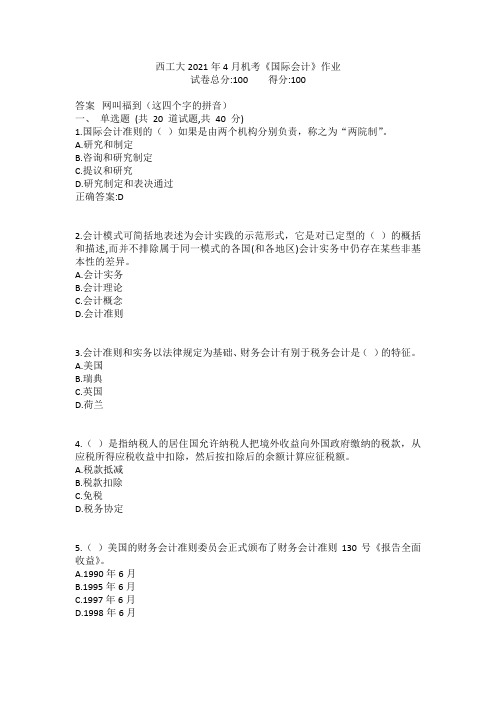
西工大2021年4月机考《国际会计》作业试卷总分:100 得分:100答案网叫福到(这四个字的拼音)一、单选题(共20 道试题,共40 分)1.国际会计准则的()如果是由两个机构分别负责,称之为“两院制”。
A.研究和制定B.咨询和研究制定C.提议和研究D.研究制定和表决通过正确答案:D2.会计模式可简括地表述为会计实践的示范形式,它是对已定型的()的概括和描述,而并不排除属于同一模式的各国(和各地区)会计实务中仍存在某些非基本性的差异。
A.会计实务B.会计理论C.会计概念D.会计准则3.会计准则和实务以法律规定为基础、财务会计有别于税务会计是()的特征。
A.美国B.瑞典C.英国D.荷兰4.()是指纳税人的居住国允许纳税人把境外收益向外国政府缴纳的税款,从应税所得应税收益中扣除,然后按扣除后的余额计算应征税额。
A.税款抵减B.税款扣除C.免税D.税务协定5.()美国的财务会计准则委员会正式颁布了财务会计准则130号《报告全面收益》。
A.1990年6月B.1995年6月C.1997年6月D.1998年6月6.美国的证券交易委员会通过它的(),对它认为必须立即制定准则的会计问题或它不同意民间准则制定机构的见解的会计问题,正面阐明自己的立场,来干预和引导会计准则的制定工作。
A.《会计系列文告》B.《财务会计准则解释》C.《会计准则公告》D.《会计公告》7.荷兰制定会计准则是由()制定的。
A.国家财政部B.官方和民间结合C.注册会计协会D.会计准则委员会8.法国由()负责发布为执行和扩展《会计方案》所需的会计准则。
A.国家会计委员会B.注册会计师协会C.国家经济与财政部D.证券交易委员会9.英国的会计标准委员会制定的会计准则称为()。
A.会计准则B.标准会计实务公告C.财务会计准则D.会计准则公告10.国际会计师联合会理事会下设有()个常设技术委员会。
A.5B.6C.7D.811.根据避税港的定义和特征,避税港具体包括的是()。
国际会计作业三答案

国际会计作业三一、判断正误1、外币兑换和外币折算这两个概念是密切相关的。
2、功能货币是计量企业的现金流量和经营成果的统一尺度。
3、套期活动意味着消除汇率变动风险,因而总能获利。
4、时态法是对区分货币性与非货币性项目法概念上的改进。
5、时态法是对区分货币性与非货币性项目法程序上的根本改变。
6、多种汇率法与现行汇率法没有根本差别。
7、外币兑换是指把外币换成本国货币、把本国货币换成外币、或是不同外币之间的互换。
8、期汇市场上的主要衍生金融工具是远期合同、期货合同、期权合同。
9、累加法和扣除法都是在计算出增值额之前,就按照增值税率计算增值税额。
10、跨国公司与单纯的国内企业相比具备固有的税务计划优势。
二、名词解释1、外币折算外币折算就是关于将非记账本位币业务按一定的汇率使用一定的计算方法转换成按记账本位币计量的经济业务的过程。
2、外币兑换外币兑换:就是两种不同货币间的实际交换。
包括国际企业以本国货币自外汇银行买入某种外币,或将某种外币卖给外汇银行获得本国货币,或通过外汇银行将某一外币转换成另一种外币。
3、国际税务国际税务是指两个或两个以上的国家(和税收管辖区),在凭借其税收管辖权对同一跨国纳税人的同一项所得征税时,所形成的各国政府和跨国纳税人之间的税收征纳关系,以及国家与国家之间的税收分配关系。
4、功能货币功能货币应该企业在从事经营活动的环境中主要使用的货币,以它作为单一计量尺度是恰当的。
三、简答题1、说明远期合同的共性和特性,它们与期权合同的不同是什么?外汇远期合同适用于对外币交易形成的特定债权、债务进行套期保值。
一般将持有至到期日进行柜台交割,不便于用来进行投机牟利。
外汇期权合同是从外汇远期合同和期货合同中又派生出来的衍生金融工具,如前述,“期权”)是一种选择权。
期权合同的买方(即持权人)享有在合同期满或之前选择执行或不执行按规定价格购入或售出一定数额的某种金融资产(如外汇、股票或计息工具等)的权利;而期权合同的卖方(即发行方、立权人)则有义务在买方要求履约时出售或买进买方所购入或售出的该项金融资产。
高级财务会计第一次~第四次作业及答案
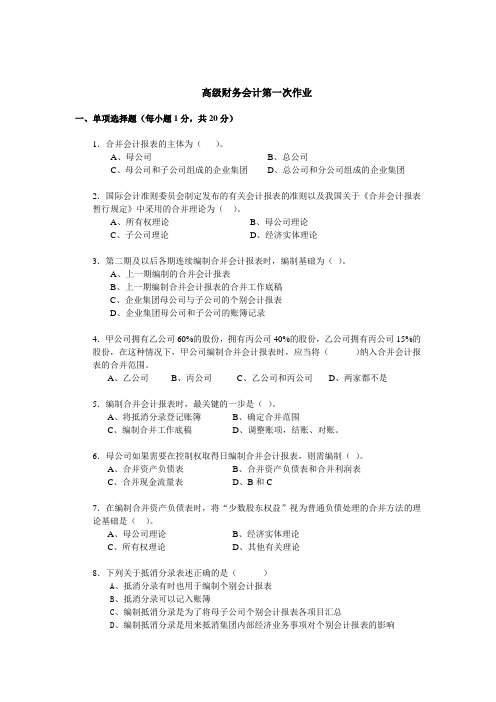
高级财务会计第一次作业一、单项选择题(每小题1分,共20分)1.合并会计报表的主体为()。
A、母公司B、总公司C、母公司和子公司组成的企业集团D、总公司和分公司组成的企业集团2.国际会计准则委员会制定发布的有关会计报表的准则以及我国关于《合并会计报表暂行规定》中采用的合并理论为()。
A、所有权理论B、母公司理论C、子公司理论D、经济实体理论3.第二期及以后各期连续编制合并会计报表时,编制基础为()。
A、上一期编制的合并会计报表B、上一期编制合并会计报表的合并工作底稿C、企业集团母公司与子公司的个别会计报表D、企业集团母公司和子公司的账簿记录4.甲公司拥有乙公司60%的股份,拥有丙公司40%的股份,乙公司拥有丙公司15%的股份,在这种情况下,甲公司编制合并会计报表时,应当将()纳入合并会计报表的合并范围。
A、乙公司B、丙公司C、乙公司和丙公司D、两家都不是5.编制合并会计报表时,最关键的一步是()。
A、将抵消分录登记账簿B、确定合并范围C、编制合并工作底稿D、调整账项,结账、对账。
6.母公司如果需要在控制权取得日编制合并会计报表,则需编制()。
A、合并资产负债表B、合并资产负债表和合并利润表C、合并现金流量表D、B和C7.在编制合并资产负债表时,将“少数股东权益”视为普通负债处理的合并方法的理论基础是()。
A、母公司理论B、经济实体理论C、所有权理论D、其他有关理论8.下列关于抵消分录表述正确的是()A、抵消分录有时也用于编制个别会计报表B、抵消分录可以记入账簿C、编制抵消分录是为了将母子公司个别会计报表各项目汇总D、编制抵消分录是用来抵消集团内部经济业务事项对个别会计报表的影响9.下列子公司中,应排除在其母公司合并会计报表合并范围之外的是()。
A、持续经营的所有者权益为负的子公司B、境外子公司C、准备近期出售而短期持有其半数以上权益性资本的子公司D、已结束清理整顿进入正常经营的子公司10.下列企业与东方公司仅有如下关系,其中应纳入东方公司合并会计报表合并范围的有()。
会计制度设计第三次形考作业
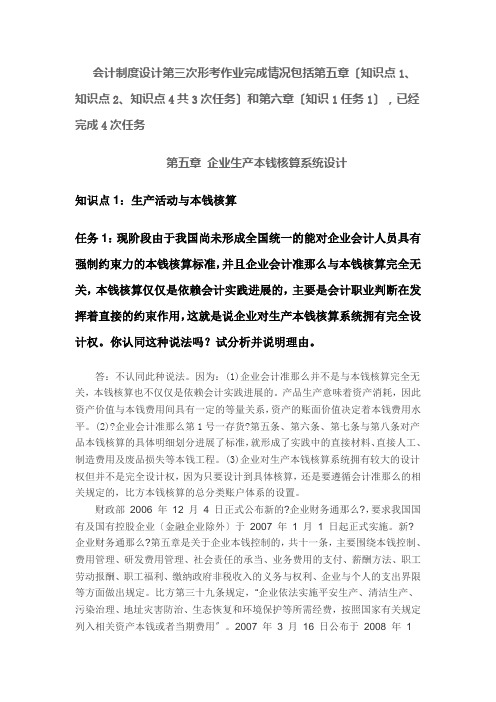
会计制度设计第三次形考作业完成情况包括第五章〔知识点1、知识点2、知识点4共3次任务〕和第六章〔知识1任务1〕,已经完成4次任务第五章企业生产本钱核算系统设计知识点1:生产活动与本钱核算任务1:现阶段由于我国尚未形成全国统一的能对企业会计人员具有强制约束力的本钱核算标准,并且企业会计准那么与本钱核算完全无关,本钱核算仅仅是依赖会计实践进展的,主要是会计职业判断在发挥着直接的约束作用,这就是说企业对生产本钱核算系统拥有完全设计权。
你认同这种说法吗?试分析并说明理由。
答:不认同此种说法。
因为:(1)企业会计准那么并不是与本钱核算完全无关,本钱核算也不仅仅是依赖会计实践进展的。
产品生产意味着资产消耗,因此资产价值与本钱费用间具有一定的等量关系,资产的账面价值决定着本钱费用水平。
(2)?企业会计准那么第1号一存货?第五条、第六条、第七条与第八条对产品本钱核算的具体明细划分进展了标准,就形成了实践中的直接材料、直接人工、制造费用及废品损失等本钱工程。
(3)企业对生产本钱核算系统拥有较大的设计权但并不是完全设计权,因为只要设计到具体核算,还是要遵循会计准那么的相关规定的,比方本钱核算的总分类账户体系的设置。
财政部2006 年12 月 4 日正式公布新的?企业财务通那么?,要求我国国有及国有控股企业〔金融企业除外〕于2007 年 1 月 1 日起正式实施。
新?企业财务通那么?第五章是关于企业本钱控制的,共十一条,主要围绕本钱控制、费用管理、研发费用管理、社会责任的承当、业务费用的支付、薪酬方法、职工劳动报酬、职工福利、缴纳政府非税收入的义务与权利、企业与个人的支出界限等方面做出规定。
比方第三十九条规定,“企业依法实施平安生产、清洁生产、污染治理、地址灾害防治、生态恢复和环境保护等所需经费,按照国家有关规定列入相关资产本钱或者当期费用〞。
2007 年3 月16 日公布于2008 年 1月1 日实施?中华人民共和国企业所得税法?,2007年11 月28 日,国务院通过了?中华人民共和国企业所得税法实施条例?,实施条例自2008年 1 月 1 日起与新企业所得税法同步实施。
会计制度设计第三次形考作业
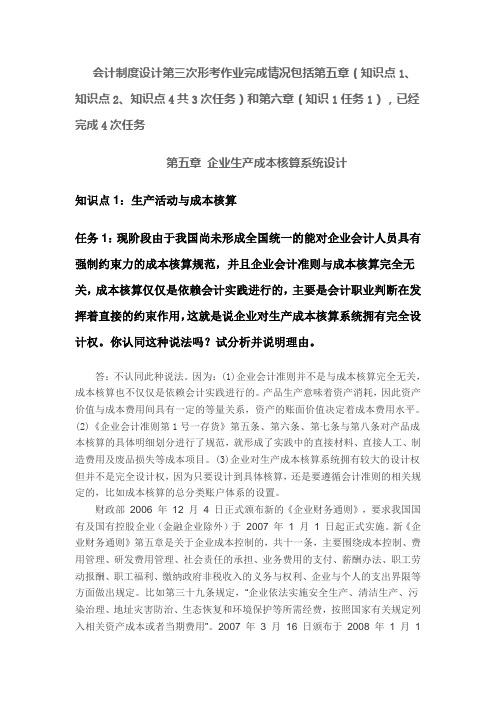
会计制度设计第三次形考作业完成情况包括第五章(知识点1、知识点2、知识点4共3次任务)和第六章(知识1任务1),已经完成4次任务第五章企业生产成本核算系统设计知识点1:生产活动与成本核算任务1:现阶段由于我国尚未形成全国统一的能对企业会计人员具有强制约束力的成本核算规范,并且企业会计准则与成本核算完全无关,成本核算仅仅是依赖会计实践进行的,主要是会计职业判断在发挥着直接的约束作用,这就是说企业对生产成本核算系统拥有完全设计权。
你认同这种说法吗?试分析并说明理由。
答:不认同此种说法。
因为:(1)企业会计准则并不是与成本核算完全无关,成本核算也不仅仅是依赖会计实践进行的。
产品生产意味着资产消耗,因此资产价值与成本费用间具有一定的等量关系,资产的账面价值决定着成本费用水平。
(2)《企业会计准则第1号一存货》第五条、第六条、第七条与第八条对产品成本核算的具体明细划分进行了规范,就形成了实践中的直接材料、直接人工、制造费用及废品损失等成本项目。
(3)企业对生产成本核算系统拥有较大的设计权但并不是完全设计权,因为只要设计到具体核算,还是要遵循会计准则的相关规定的,比如成本核算的总分类账户体系的设置。
财政部2006 年12 月 4 日正式颁布新的《企业财务通则》,要求我国国有及国有控股企业(金融企业除外)于2007 年 1 月 1 日起正式实施。
新《企业财务通则》第五章是关于企业成本控制的,共十一条,主要围绕成本控制、费用管理、研发费用管理、社会责任的承担、业务费用的支付、薪酬办法、职工劳动报酬、职工福利、缴纳政府非税收入的义务与权利、企业与个人的支出界限等方面做出规定。
比如第三十九条规定,“企业依法实施安全生产、清洁生产、污染治理、地址灾害防治、生态恢复和环境保护等所需经费,按照国家有关规定列入相关资产成本或者当期费用”。
2007 年3 月16 日颁布于2008 年 1 月 1日实施《中华人民共和国企业所得税法》,2007年11 月28 日,国务院通过了《中华人民共和国企业所得税法实施条例》,实施条例自2008年1 月 1 日起与新企业所得税法同步实施。
2023年电大会计专业网上作业答案国际结算

单项选择题【111803】下列有关FEDWIRE说法错误旳是()。
A.FEDWIRE是中央银行拥有并经营旳B.FEDWIRE是美国境内美元收付系统C.FEDWIRE资金转账系统是一种实时旳、全额旳、贷记旳资金转账系统D.FEDWIRE是一种由纽约清算协会拥有并运行旳一种私营支付系统答案:D单项选择题【111807】跨国流动旳票据,其出票人和收款人可以是全球任何地方旳企业或个人,不过票据旳付款人或担当付款旳人必须是()。
A.国际商业银行B.收款人所在地旳银行C.所付货币清算中心旳银行D.付款人所在地旳银行答案:C单项选择题【111794】下列不属于国际结算范围旳是()。
A.有形贸易类B.物物互换类C.无形贸易类D.金融交易类答案:B单项选择题【111793】现代国际结算就是指通过银行办理旳国与国之间旳()收付业务。
A.信用证B.支票C.货币D.汇票答案:C单项选择题【111797】一般而言经营银团贷款业务旳是()。
A.银团银行B.办事处C.代理银行D.联营银行答案:A单项选择题【111795】结算工具包括货币现金、()以及电报、邮寄支付凭证等。
A.票据B.黄金C.信用卡D.代金券答案:A单项选择题【119237】银行建立代理关系时旳控制文献不包括()。
A.密押B.代理范围C.费率表D.印鉴答案:B单项选择题【111799】下列属于国际银行间非营利性组织旳是()。
A.FEDWIREB.CHIPSC.TARGETD.SWIFT 答案:D单项选择题【111796】现金结算已越来越不符合实际旳需要,于是出现了()等非现金结算方式。
A.黄金B.铸币C.商业汇票D.股票答案:C单项选择题【111802】下列有关代理行与账户行关系旳表述不对旳旳是()。
A.代理行并不一定就是账户行B.账户行一定是代理行C.两家银行互设账户时其关系肯定是代理行D.一方在另一方开设账户,而另一方没有在第一方开设账户,它们之间旳关系就不是账户行旳关系答案:D单项选择题【111805】下列说法错误旳是()。
国际财务管理作业3(题目及参考答案)

国际财务管理作业31、远期外汇交易(1)(远期汇率计算)某日英国伦敦的外汇市场报价如下:英镑对美元的即期汇率为:1GBP =USD1.5392 / 1.5402,2个月的远期点数21/24;英镑对法国法郎的即期汇率为:1GBP=FRF7.6590 / 7.6718,2个月的远期点数252/227,试计算:英镑对美元以及英镑对法国法郎两个月的远期汇率分别为多少?解:英镑对美元两个月的远期汇率1GBP=USD(1.5392+0.0021)/ (1.5402+0.0024)1GBP=USD1.5413/1.5426英镑对法国法郎两个月的远期汇率1GBP=FRF(7.6590-0.0252) / (7.6718-0.0227)1GBP=FRF7.6338/7.6491(2)巴黎外汇市场美元对欧元的即期汇率是1美元=0.8200-0.8240欧元,三个月远期贴水为340-330,我某公司出口一批机床,原报价每台机床30 000欧元。
现法国进口商要求我改用美元向其报价,且三个月后才能收汇。
问我应改报多少美元?解:(1)首先弄清l美元=0.8200-0.8240欧元为直接标价法,直接标价法下升水加贴水减三个月后美元对欧元的汇率:1美元=(0.8200-0.0340)-(0.8240-0.0330)欧元即l美元=0.7860-0.7910欧元(2)其次清楚0.7860为买入价,0.7910为卖出价(3)再有改报多少美元,最初报价30 000欧元,表明最后要得到的是欧元,这样改报的美元数应该能够换回所需要的欧元数,那么卖给银行美元用买入价即改报美元数:30 000/0.7860=38170美元(3)P教材85:第四题解:收:5000÷100×81.21=4060.5万元人民币减少损失为50万元(4)某个澳大利亚进口商从日本进口一批商品,日本厂商要求澳方在3个月内支付10亿日元的货款。
当时外汇市场的行情是:即期汇率:1澳元=100.00~100.12日元3月期远期汇水数:2.00~1.90故3月期远期汇率为:1 澳元=98.00~98.22日元如果该澳大利亚进口商在签订进口合同时预测3个月后日元对澳元的即期汇率将会升值到:1澳元=80.00—80.10日元问题:1)若澳大利亚进口商不采取避免汇率风险的保值措施,现在就支付10亿日元,则需要多少澳元?2)若现在不采取保值措施,而是延迟到3个月后支付10亿日元,则到时需要支付多少澳元?3)若该澳大利亚进口商现在采取套期保值措施,应该如何进行?3个月后他实际支付多少澳元?解:1)该澳大利亚进口商签订进口合同时就支付10亿日元,需要以1澳元=100.00日元的即期汇率向银行支付10亿/100.00=0.1亿澳元,即10,000,000澳元。
- 1、下载文档前请自行甄别文档内容的完整性,平台不提供额外的编辑、内容补充、找答案等附加服务。
- 2、"仅部分预览"的文档,不可在线预览部分如存在完整性等问题,可反馈申请退款(可完整预览的文档不适用该条件!)。
- 3、如文档侵犯您的权益,请联系客服反馈,我们会尽快为您处理(人工客服工作时间:9:00-18:30)。
一、单选题
1.(3分)()6月美国的财务会计准则委员会正式颁布了财务会计准则130号《报告全面收益》。
• A. 1990年
• B. 1995年
• C. 1997年
• D. 1998年
答案C
2.(3分)早在()年,法国在《关于公司法改革的报告》中就建议公司每年公布“社会资产负债表”,即“社会报告”。
• A. 1970
• B. 1965
• C. 1977
• D. 1975
答案D
3.(3分)在财务报告中披露企业的社会责任始于()。
• A. 20世纪60年代
• B. 20世纪70年代
• C. 20世纪80年代
• D. 20世纪90年代
答案A
4.(3分)我国于()起执行《企业会计准则—现金流量表》,以取代财务状况变动表。
• A. 1998年1月1日
• B. 1998年7月1日
• C. 1999年1月1日
• D. 1999年7月1日
答案A
5.(3分)由于()的存在,使得很难对财务分析进行国际比较。
• A. 会计多样性
• B. 会计单一性
• C. 谨慎性
• D. 原则性
答案A
6.(3分)()的主要目的是为了跨国公司合并其遍布世界各地的子公司的个别报表,这需要把按不同外币(往往是各子公司所在的东道国当地货币,也可能是第三国货币)表述的报表折算为母公司单独报表中的报告货币(往往是母公司所在国的货币)。
• A. 编制合并报表
• B. 外币交易折算
• C. 资产减值
• D. 外币报表折算
答案D
7.(3分)在资产的确认上,关于()的确认也许是最突出的问题。
• A. 固定资产
• B. 存货
• C. 无形资产
• D. 交易性金融资产
答案C
8.(3分)增值表是一种反映社会责任和分配关系的报表,它()。
• A. 始创于亚洲,流行于欧洲
• B. 始创于欧洲,流行于西欧
• C. 始创于亚洲,流行于亚洲
• D. 始创于西欧,也流行于西欧
答案D
9.(3分)在法国、德国、瑞士和日本,税法普遍鼓励使用()。
• A. 加速折旧法
• B. 直线法
• C. 双倍余额递减法
• D. 间接法
答案A
10.(3分)股份公司业主权益会计中的国际差别,很多来自各国不同的()要求。
• A. 道德
• B. 民间自律组织
• C. 法律
• D. 商业惯例
答案C
二、多选题
1.(4分)美国的财务会计准则130号将全面收益的报告方式规定为()。
• A. 传统收益表和附加报表
• B. 传统收益表加新基本报表“全面收益表”
• C. 传统收益表与“全面收益表”合为单一报表
• D. 传统收益表加权益变动表
答案B,C
2.(4分)现行汇率法有超越时态法成为国际通行惯例的趋势,因为()。
• A. 在跨国公司经营活动中,自主经营的独立实体的发展超越了作为母公司经营活动延伸的国外经营
• B. 在合并报表的编制中,主体观有取代母公司观成为国际通行惯例之势
• C. 现行汇率法这种单一折算法,较时态法更为简便
• D. 子公司是在海外相对自主经营的独立实体
答案A,B,C
3.(4分)对外国公司财务报告所作的披露和调整方法包括()。
• A. 翻译和折算
• B. 增加专用信息
• C. 增加辅助财务报表
• D. 重新表述
答案A,B,C,D
4.(4分)下列关于资产负债表的说法正确的是()。
• A. 美国和受美国会计模式影响的其他国家的企业大都采用账户式,资产列在左方,负债和业主权益列在右方
• B. 采用账户式资产负债表的大多数英联邦国家的企业恰好相反,把资产列在右方,把负债和业主权益列在左方
• C. 英国和欧洲大陆各国还流行一种称为“营运资本式”的资产负债表
• D. “营运资本式”的资产负债表是在表的上端,先列示企业流动资产减去流动负债后的营运资本
答案A,B,C,D
5.(4分)以下哪些国家的财务报告相对缺乏透明度,因而在进入国际资本市场是需要付出更多的努力()。
• A. 德国
• B. 日本
• C. 瑞士
• D. 中国
答案A,B,C
6.(4分)资本市场的各种参与者须包括()等。
• A. 投资者
• B. 发行者
• C. 证券承办人
• D. 监管者
答案A,B,C,D
7.(4分)在推动企业报告社会责任方面作出努力的国际组织主要有()。
• A. 联合国跨国公司中心
• B. 国际会计准则委员会
• C. 经济合作与发展组织
• D. 欧洲经济共同体
答案A,C,D
8.(4分)世界各国,常见的资产负债表的格式主要有()。
• A. 账户式,资产列在左方,负债和业主权益列在右方
• B. 账户式,资产列在右方,而把负债和业主权益列在左方
• C. 营运资本式
• D. 传统式
答案A,B,C
9.(4分)对社会责任披露的争论主要表现在()。
• A. 披露的内容
• B. 披露的时间
• C. 披露的后果
• D. 对企业有关社会责任的投入与产出应该侧重定量反映还是定性披露
答案A,D
10.(4分)与商誉有关的是无形资产事项,如(),它们被普遍地进行资本化(除瑞士),但通常要进行摊销或者减值测试。
• A. 商标
• B. 版权
• C. 专利权
• D. 税金
答案A,B,C
三、判断题
1.(3分)收益表的重大国际差异表现在欧洲大陆国家按总费用法编制损益表的传统格式。
答案正确
2.(3分)应收票据和应收账款等应收款项,不可避免地会发生坏账损失。
确认坏账损失有两种方法:直接销账法和备抵法。
备抵法是西方国家流行的惯例。
答案正确
3.
(3分)英国会计准则委员会发布的财务报告准则第3号的要求将“全部已确认利得与损失表”作为基本财务报表之一。
答案正确
4.(3分)财务报表中不包括附注、附表和其他信息。
答案错误
5.(3分)关于资产负债表项目的排列,欧洲大陆国家的企业一般把变现能力最强的项目列在最先。
答案错误
6.(3分)1992 年10 月,英国会计准则委员会发布了财务报告准则第3 号《报告财务业绩》,率先要求企业将“全部已确认利得和损失表”作为对外编报的主要财务报表。
答案正确
7.(3分)对长期股权投资采用成本法或权益法的股权界限量化标准,其国际惯例早已为IAS3和美、英等主要西方国家的会计准则所肯定。
答案正确
8.(3分)国际会计准则委员会1997年8月发布的修订后的IAS1《财务报表的列报》中也提出了改革业绩报告的要求。
答案正确
9.(3分)会计准则是筛选出来的“标准”的会计惯例,会计惯例一般地说是当时流行的会计准则。
答案正确
10.(3分)为了保证本国投资者能够得到作出正确判断所需要的财务信息,许多国家政府都对进入本国证券市场的外国公司提出了专门的强制性的信息披露要求。
答案正确。
